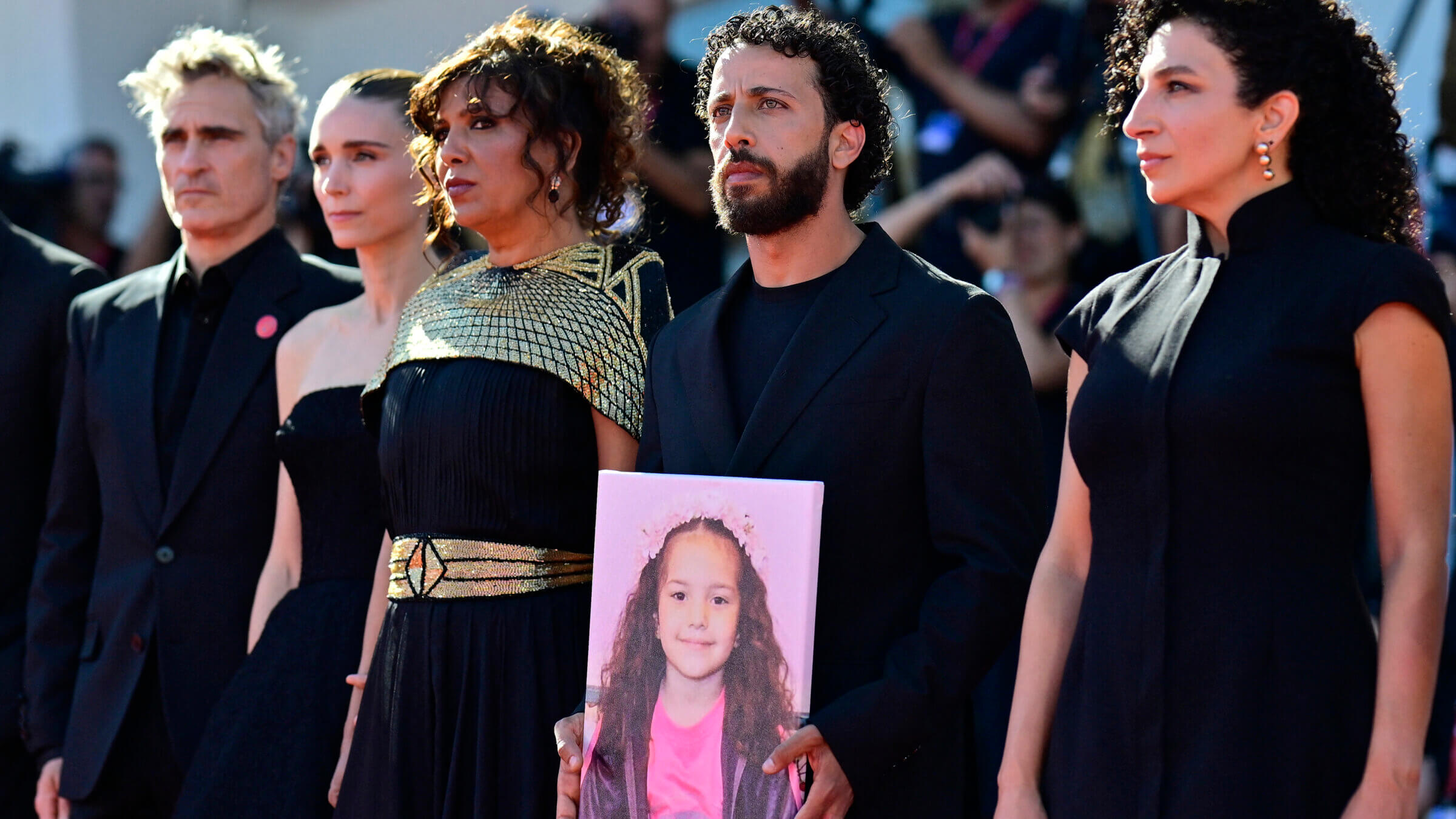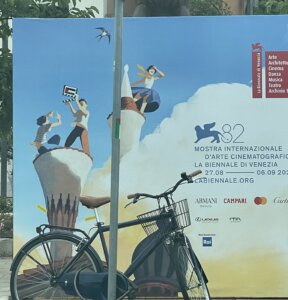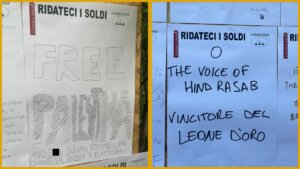‘The Voice of Hind Rajab’ shows the impossibility of providing aid in Gaza. But will it lead to real change?
The film’s second-place win at the Venice Film Festival drew accusations of performative activism

From left: Joaquin Phoenix, Rooney Mara, Kaouther Ben Hania, Motaz Malhees and Clara Khoury pose with a portrait of late Palestinian girl Hind Rajab during the red carpet for the movie “The Voice of Hind Rajab” presented in competition at the 82nd International Venice Film Festival. Photo by TIZIANA FABI/AFP via Getty Images
“May G-d soften the hard heart towards you.”
Those are among the last words Wissam Hamadah spoke to her daughter Hind Rajab, a five-year-old Palestinian girl who was killed in the Israeli invasion of the Gaza Strip in January, 2024. The events surrounding her death have been captured in The Voice of Hind Rajab, a new scripted film from Kaouther Ben Hania.
The entire film, which won the second-place Silver Lion Grand Jury Prize at the Venice Film Festival, takes place at the Ramallah Red Crescent Emergency Call Center in Ramallah, where a team of dispatchers attempts to coordinate Hind’s rescue, and has been lauded for drawing attention to Hind’s story. But the film, and the festival, has also drawn accusations of using the young girl’s story to allay pressure from pro-Palestinian activists.
As the film opens, Omar (Omar A. Alqam), first receives a call from one of Hind’s relatives and hears the woman scream as gunfire rings out. The line drops but Omar soon receives a message from one of the family’s relatives in Germany, asking Omar to call the phone back as there is a girl still trapped in the car. Thus begins a five-hour phone call with Hind, who is surrounded by the six bodies of her uncle, aunt, and cousins.
Although the interactions at the call center are dramatized, Ben Hania, best known for the documentary Four Daughters, used the actual phone call audio. The cries of Hind’s dying relative are real. Hind’s desperate pleas for help and the sounds of bombs and gunfire around her are real. The name of her school, which the dispatchers ask for in an attempt to distract her, is painfully real: A Happy Childhood. Combining reenactments with the real phone calls prevents the film from devolving into trauma porn, but Ben Hania also makes sure audiences never forget that the movie they’re watching is not fiction.
Despite the fact that most viewers already know the outcome of the events, the movie provides a gripping and intimate narrative about the complex nature of rescues in Gaza. The coordinator, Mahdi (Amer Hlehel) has to first contact the Red Cross, who then contacts the Coordination of Government Activity in the Territories (a branch of Israel’s Defense Ministry), who can then send an approved route back to Mahdi outlining where the ambulance can safely drive without being shot at by Israeli forces in the area. However, even if a route is set, the ambulance must wait for a green light to let them know it is safe to proceed. Although the rescue team is less than a 10 minute drive away from Hind, it takes nearly five hours before they are given permission to move.
As the hours tick by, tensions between Mahdi and Omar grow. Mahdi argues that he has to protect the lives of the medical workers in Gaza — at the time, the last team they had positioned in the North — and think about their families. Omar grows increasingly desperate, asking Mahdi to try contacting the Israeli military directly, at one point disobeying orders by trying to call the emergency team himself and yelling at the Red Cross on the phone. Frustrated by his seeming passiveness, Omar tells Mahdi “It’s because of people like you that we’re occupied!”
Ben Hania does not just trace the deterioration of the resolve of the workers, but also that of Hind. While Hind starts off telling the dispatchers, with heartbreaking innocence, that her family members are sleeping, she eventually cries out that they are all dead. Omar and his colleagues’ goal becomes not just saving Hind, but trying to protect her psychologically from over 50 miles away
The film underscores the fact that Hind’s death never would have happened in a working system. A miscommunication leads to the accidental cancellation of the rescue request which the Red Cross then refuses to re-open, having already turned their resources elsewhere. Once the rescue team, composed of Youssef Zaino and Ahmed Al-Madhoun, finally heads towards Hind, they have to reroute three times as their maps cannot be updated quickly enough to show newly bombed areas that block their way.
When the ambulance does arrive at the gas station, they tell Mahdi that they have made contact with a green laser, a sign that the Israeli military has identified them and that they have permission to enter the area. However, the celebratory feeling among the workers is short-lived. The line goes dead. Soon after, Hind’s call drops as well.
The film closes with real footage of the ambulance and the car. The ambulance was bombed; workers are shown pulling the remains of Zaino and Al-Madhoun from the wreckage. The car transporting Hind and her family members sustained 355 bullets. Ben Hania includes archival footage of Hamadah weeping next to the body of her daughter, which wasn’t recovered until a dozen days after the call. After spending nearly 90-minutes watching the Red Crescent employees work tirelessly to save Hind, the final scene evokes a crushing sense of despair.
Backlash against the festival and the jury
The film’s debut at Venice was highly anticipated, especially after the news that Hollywood stars like Brad Pitt and Joaquin Phoenix signed on as executive producers, and it received what is believed to be the longest standing ovation in the history of any film festivals. But though Ben Hania has been lauded for her bringing Hind’s story to light and for including her family in the process, some have accused the executive producers and the festival of using the film to avoid any other responsibility for advocating against the war in Gaza.
Even before it started, the Venice Film Festival faced the ire of pro-Palestinian activists. Venice4Palestine, a group of Italian cinema professionals, created a petition asking that Gal Gadot, who was in a film premiering at the festival, be banned from attending due to her position on the war. (She did not attend in the end, but not because of the petition according to a representative.)

The tension about the war was palpable throughout the festival. Someone put a sticker of the Palestinian flag on one of the official festival posters. Indya Moore, part of the cast of the film Father Mother Sister Brother, which won the first-place Golden Lion, wrote “Stop the Genocide” on someone’s autograph book on the red carpet. (Whether they asked for this message is unknown.) A pro-Palestine protest, in part organized by Venice4Palestine, took place outside of the festival grounds. On a wall where attendees could pin notes with their thoughts about the films, people called for a free Palestine and lambasted Gadot’s film.

Representatives of the festival have pointed to the inclusion of films about Palestine such as Voice of Hind Rajab and the Gaza documentary Who Is Still Alive as evidence of the festival’s willingness to address Gaza. But for some, just showing films is not enough.
Twitch streamer Hasan Piker expressed such concerns about Voice of Hind Rajab on a recent stream, stating: “If all that amounts to is ‘Oh, I felt so sad’ and then that’s it, then this is an abject failure. It’s exploitation as a matter of fact.” Piker also read a tweet that highlighted the dissonance of cheering for a film about an ongoing war at a luxury event.
As an attendee of the festival, I can say that the juxtaposition of politics and extravagance sometimes felt surreal. At the red carpet for The Voice of Hind Rajab, while the cast, Ben Hania, and Phoenix held up a photo of the little girl, fans at the barricade cried “Joaquin!” to try and get the actor’s autograph. It’s possible they were unaware what film the red carpet was for (there is no signage and few non-accredited attendees receive a premiere schedule) and didn’t realize how inappropriate their behavior was. Or maybe, in the face of a famous actor just feet from them, they just didn’t care.

















